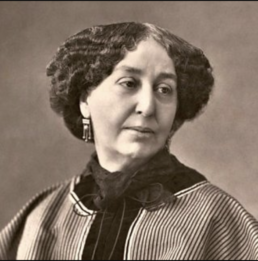These life stories may contain descriptions of childhood trauma and abuse, as well as images, voices and names of people now deceased. If you need help, you can find contact details for some relevant support services on our support page.
Eminent French writer, George Sand (1804-1876), was in kinship care as a child.
Amantine Lucile Aurore Dupin was born in Paris and was known as Aurore in her family. Her parents were Captain Maurice Francois Dupin, from an aristocratic family, and Antoinette Sophie-Victoire Delaborde, who grew up in an impoverished working-class family, was orphaned at age fourteen and supported herself through sex work.
Maurice died when Aurore was four and his mother, Mme Dupin de Francueil, gave Aurore’s mother, Sophie, a pension to stay away while she raised the child at her Nohant estate in the south-west of France. Having read Rousseau, Mme Dupin allowed her granddaughter free reign on the country estate, while also insisting she learn ‘proper’ French. When her grandmother decided that Aurore at age thirteen had become too wild, she was sent off to live in a Paris convent.
Aurore’s grandmother died when Aurore was seventeen. Twelve months later she married Casimir Dudevant. Unfortunately, it soon became apparent that Casimir was only interested in Dupin’s fortune and treated her poorly.
In 1831, Aurore left her husband and moved to Paris. She began publishing articles and a novel with novelist Jules Sandeau under the name Jules Sand. A year later, she published her first solo novel, Indiana, under the name George Sand. The novel told the story of a wife rebelling against a controlling husband and the social conventions surrounding marriage which left women powerless; it received wide acclaim and brought George Sand immediate fame.
George Sand’s lifelong love of the countryside, which had begun in childhood, influenced many of her later rustic or pastoral novels.
George Sand became the most famous woman writer in France during the 19th century and was known internationally. She was also well-known for her unconventional lifestyle, her work ethic, her many intimate relationships (including with composer Frederic Chopin, her generous hospitality, and her caring for the tenants who worked her estate.
References:
Eisler, Benita. “The passions of George Sand.” Los Angeles Times, 2 January 2005. https://www.latimes.com/archives/la-xpm-2005-jan-02-bk-eisler2-story.html
“George Sand.” In Our Time, BBC Sounds, 6 February 2020. https://www.bbc.co.uk/programmes/m000dxsr
Jack, Belinda. “George Sand. A Woman’s Life Writ Large.” The New York Times, 2000. https://archive.nytimes.com/www.nytimes.com/books/first/j/jack-sand.html
Salmon, Bernita. “The works of George Sand as an interpretation of her life and personality: a thesis.” University of the Pacific, 1931. https://scholarlycommons.pacific.edu/cgi/viewcontent.cgi?article=1921&context=uop_etds
“George Sand French Novelist.” Britannica. https://www.britannica.com/biography/George-Sand
Image available here.
